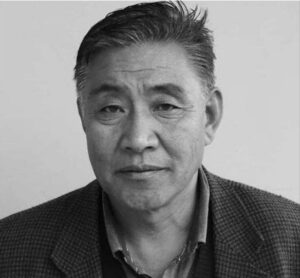 PROFILE:
PROFILE:
• Born in Jangthang, Ladakh in 1965
Work History:
• Worked as shepherd in Ladakh until he was 16
• Joined the Indian Military in 1981, serving for 14 years until 1995
• Worked briefly as an Indian contractor
• Operated his own coal mining business
• Worked on a project called “Nurse for Canada”, a programme that mediated between Tibetan nursing students and Canadian nursing position
Key Points:
• Improve quality and accessibility of education
• Enhance Tibetan unity and participation through financial equality
• Supports the Middle Way Approach*
• Promises a cabinet consisting of other Sikyong candidates
Tashi Topgyal announces his decision to join the 2021 Sikyong race once again after his first contention for the seat in 2016. Acknowledging the possible discontent that may arise from his lack of educational background, Topgyal asserts that “no education qualification is required to run for the office” during his Facebook live stream. In fact, calling himself a “shepherd” in this race, he believes that “the [Sikyong] opportunity should be given to a visionary like me rather than to an educated candidate.” To him, the lack of progress made by the past two Sikyongs demonstrates that there are more important qualities to a candidate than educational background. “Those who grew up in the grand cities of the United States and the likes can only see the problems faced by the public but can’t resolve it,” he explains, and adds that, unlike them, he is “a commoner just like every one of you.”
Topgyal’s manifesto emphasises the role of unity, Tibetan identity and education in achieving a resolution of the Tibetan issue. Affirming the necessity of a strong sense of community for Tibetans to successfully carry out equitable dialogue with the Chinese government, he worries about the pessimistic tones surrounding discussions on Tibet amongst the people in exile today. In his last campaign, he pointed to the overall decline of community solidarity amongst exiled Tibetans as an explanation for this rising pessimism. He had attributed this to the increase in income inequality within the community, and concluded that this discord can be mended by pursuing greater financial equality as a way forward. Topgyal also asserts the need to preserve Tibeten identity, and brings up the issue of self-immolations in Tibet as a reminder of this urgency.
In congruence with his 2016 manifesto, education remains the central pillar of Tashi Topgyal’s manifesto for next year’s election. In the last campaign, he expressed his intentions to improve the quality and the accessibility of education for Tibetans in exile. To achieve this, Topgyal promised an increase in the wages of educators, as well as the employment of additional maintenance staff so that students can focus on their studies rather than spend time preparing food and cleaning during school hours.
In line with his visions of reinstalling solidarity and unity in the Tibetan community, Topgyal declares that the seats in his cabinet will be offered to all his fellow candidates who are currently running for Sikyong. He explains that this will be his way of saluting their commitment to the community, and hopes that this declaration can show the public that his decision is not on the basis of his own interests, but is instead based solely on the interests of the Tibetan people.
*MWA refers to the policy proposed by His Holiness the Dalai Lama, and endorsed by the Central Tibetan Administration or Tibetan Government-in-Exile, which seeks “genuine autonomy” for Tibet under People’s Republic of China rule.
For more about the election click here




 Print
Print Email
Email